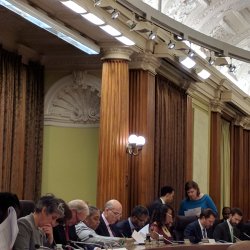Today, the D.C. Council chamber overflowed with interested citizens at the last legislative meeting of 2018. Clean energy supporters were there in large numbers--including a couple of us representing GRID Alternatives Mid-Atlantic.
We were eagerly awaiting the Council’s vote on the most ambitious climate and energy law in the country, and a model for other cities and states: the “Clean Energy DC Omnibus Amendment Act of 2018.” The Council debated some last amendments to the bill at the December 18 hearing, but more time was spent thanking advocates and recognizing the historic nature of the bill the Council was about to pass--unanimously!
Introduced by Councilmember Mary Cheh earlier this year, the Clean Energy DC bill strengthens the Renewable Portfolio Standard (RPS) to require 100 percent of the District’s energy to come from clean, renewable sources by 2032, double the previous RPS of 50% by 2032. The bill has a strong carve-out for solar to strengthen the market for solar renewable energy credits, which will help GRID Mid-Atlantic fund more solar installations for our income-qualified clients and affordable housing providers, and more solar industry training for members of our community. In addition, among other provisions, the bill requires new energy efficiency standards for buildings (including large existing buildings); directs increased funding to energy assistance for low-income residents and small local businesses; and starts to lay the groundwork for a cleaner transportation system.
Through summer and fall 2018, GRID Alternatives Mid-Atlantic’s Executive Director, Nicole Steele, and GRID Policy and Regulatory Manager, Andie Wyatt, testified (03:42) and advocated in support of the Clean Energy DC bill, while requesting strengthened equity provisions. Some, but not all, of our recommendations were incorporated into the final bill: some more funding is directed to ensure that the benefits of renewable energy are available equitably to all in the District, for example, and there is new workforce development language.
The final bill didn’t incorporate the specific protections GRID wanted for D.C.’s existing Solar for All program, which requires the District to provide solar to 100,000 D.C. residents and reduce their electricity bills. However, that program remains the law, and the Clean Energy D.C. bill should result in a stronger funding base for it. We have every reason to believe that the Solar for All program will remain a central part of DC’s commitment to a more equitable transition to clean, renewable energy, especially in light of the great success of GRID’s Solar Works DC program which Solar for All supports.
The Clean Energy DC Omnibus Amendment Act now goes to the Mayor for her consideration. Following her signature or approval, there is a 30-day period of review in Congress (where, it should be noted, D.C. has no representation) before it can become effective.
Our nation’s capital is on its way to being powered by 100 percent clean and renewable energy, and GRID looks forward to helping implement this historic bill as inclusively as possible.

